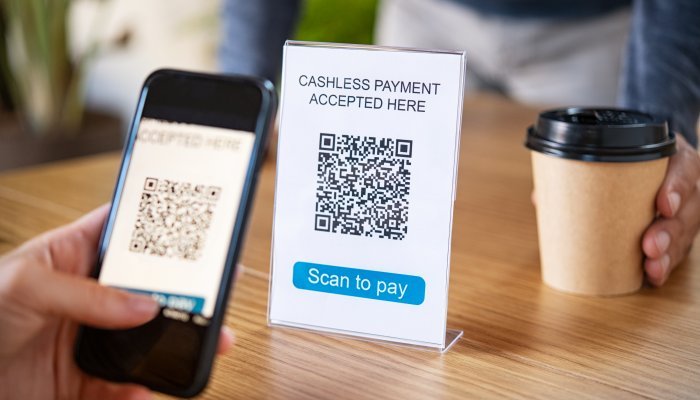The conventional wisdom is that cash is on the way out as we enter the brave new world of QR codes, digital identity and instant payments. In an increasingly digital world, so the story goes, cash condemns both individuals and businesses to increasing marginalisation.
All true. But also not the whole story. Our relationship with cash is complex and long-standing, and reports of its imminent death are exaggerated.
Globally, cash is being used in fewer transactions. Norway and Sweden, unsurprisingly, lead the pack. In Sweden, the proportion of people paying with cash fell from around 39% in 2010 to 9% in 2020.
And yet, Germany, Europe’s largest and most important economy, uses cash for 80% of all retail transactions at the point of sale. It seems as though the divide between countries that like cash and those that tend to prefer digital is not based on technology or the sophistication of the economy.
One of the big outcomes of the lockdowns was a surge online, where payment is digital. But while ATM transaction volumes in Britain slumped by 60% during the first month of the 2020 lockdown, things have since returned to normal. That normal, says Graham Mott, director of strategy at Link, Britain’s largest ATM network, includes a steady decline of around 10% per year in the use of cash for payments. This scenario plays out across multiple regions.
Another important trend is that even as the use of cash in transactions drops, demand for banknotes rises, something that also increased during lockdown. The United States saw a 16% increase in the value of banknotes in circulation in 2020, with the corresponding figure in the Eurozone being 11%. Mexico saw a startling increase of 30%.
Globally, the total value of cash in circulation is growing at a steady 5%-8% annually. Cash remains a reliable store of value for emergencies and thus contributes to making an economy more resilient.
In fact, central banks do not want to see the end of cash altogether because this would loosen the link between a state and its currency. Many countries, including cashless bellwether Sweden, have committed to preserving cash through legislation. In South Africa as in the United Kingdom, adds Ghita Erling, CEO of the Payments Association of South Africa (PASA), the real motivation is the inclusion of the under- and unbanked.
What does this all mean for South Africa?
What’s going on here? And, more importantly, what are the implications for South Africa?
The first point that needs to be made is that there are many millions of people who remain dependent on cash –even in developed countries. Five to eight million people in Britain still need cash, and the proportion is even higher here.
A number of factors are in play, including a lack of trust in digital channels and fees that are too expensive. In South Africa, a large proportion of citizens receive social grants of one kind or another, and immediately withdraw all the money – the same could be said for many salary earners. Cash payments continue to grow at 6-8% per year.
PASA’s Erling makes an important point when she argues that withdrawing all one’s cash each month may be perfectly rational behaviour, given the costs of transport to get to a bank or ATM. Additionally, she says, there is little or no acceptance of digital payments in the areas in which the majority lives.
“It’s all about acceptance,” she says. “If more spaza shops, taxis and even pavement vendors accepted digital payments, we would see the use of cash decline much more in line with developed markets.”
High costs of cash
Research by Genesis analytics found that cash costs South African consumers around R23 billion or 0.52% of GDP, with the poor bearing the heaviest burden. Four percent of their earnings (as compared to the national average of 1.1%) go towards costs, which include withdrawal fees, travel costs, money lost to crime and interest foregone.
There’s also a huge opportunity cost because people and businesses dealing in cash find it hard to access finance – and credit (properly managed, of course) is the single biggest lever of growth for both. This is because cash leaves no trail that can be used to demonstrate the ability of a business or individual to take on debt.
This is a crucial point because South Africa is a major outlier when it comes to the role of SMMEs in creating jobs. SMMEs make up 98.5% of the South African economy, but they only deliver 28% of all jobs – government and big business are the big job creators. By contrast, in OECD countries SMMEs employ 60-70% of the working population and contribute as much as 60% to GDP.
Bearing all this in mind, the National Development Plan’s aim of SMMEs creating 90% of jobs by 2030 looks unachievable. There’s a good argument that over-reliance on cash is one of the culprits here: inability to access finance is typically listed as one of the most common reasons for SMME failure.
Moving people away from cash and onto digital transaction platforms is ultimately an issue of financial inclusion and supporting growth – multiple research studies indicate that financial inclusion has a positive effect on economic growth. (For one example, see Mohammad Naim Azini, “New insights into the impact of financial inclusion on economic growth: A global perspective”.) It’s for this reason, presumably, that it is so prominent in the South African Reserve Bank’s Vision 2025.
How to move the dial
GIBS’ Professor Manoj Chiba says that a number of things need to be in place to start weaning South Africans away from their over-reliance on cash. One is a critical mass in terms of mobile devices, another is that the populace needs to come to grips with the notion that fees have to be charged for the convenience of transacting digitally. It’s perhaps significant, he says, that stokvels are becoming more tech-savvy; given their popularity, this could be a significant nudge.
The key, says Chipo Mushwana, an executive for emerging innovation at Nedbank, is that digital payment must mimic cash as closely as possible. That means, she believes, it must have low (or preferably zero) fees, and both the payment and notification of payment must be instant.
“You can’t impose a solution on the market – that will destroy trust,” she warns. PASA’s Erling agrees that trust is a major issue in building acceptance of digital payments.
E-wallets or m-wallets and QR codes are already making inroads into cash payments, and the launch in March of PayShap was a major milestone. PayShap is an instant payment service developed by Bankserv Africa, the financial industry’s clearing bank. It allows individuals and businesses to make instant payments using a proxy such as a cellphone number instead of bank account details.
When it comes to mimicking cash, immediacy is the key, Chiba believes. For Michael Jordaan, the former CEO of FNB and current chair of Bank Zero, it’s fees: he argues that PayShap will only work if it’s free. Only Nedbank has seen the light, with a R1 fee for all transactions.
The second phase of PayShap will launch request to pay, which means the merchant can initiate the payment. “Push payments will be the game-changer,” Erling believes.
At the other end of the scale, it could be that digital currencies such as Bitcoin could ultimately take the place of cash, but there is a long road ahead before they are ready for the mass market. The main issue, Chiba argues, is that there are too many digital currencies.
“In 10 or so years, there will be two or three survivors and then they might become a mainstream contender,” he says.
Cash is not running out of road
While cash is declining as a means of payment globally, South Africa still has much work to do in persuading its mass market to use digital channels and thus, hopefully, increase economic activity across the board.
A key will be creating digital payment mechanisms that closely resemble cash, and the launch of PayShap looks like it has the potential to shift the dial provided sufficient weight is put behind educating the mass market about how to use it and its benefits.
But, as in the rest of the world, it’s highly likely that cash will continue to account for a significant proportion of daily transactions, and remain a store of value in emergencies.
Cash might not be king any longer, but it looks set to remain part of the royal family.
KEY TAKEAWAYS
- Cash remains important as a payment mechanism, particularly in South Africa, as well as a store of value for emergencies.
- Initiatives to encourage greater use of digital payment mechanisms are afoot, and hinge on their ability to mimic cash.
- The move onto digital payment platforms is important to improve financial inclusion and support economic growth – in particular to make our SMME sector more viable and create more jobs.
- By implication, businesses should ensure they can accept a range of payment types in line with the changing payment landscape.








